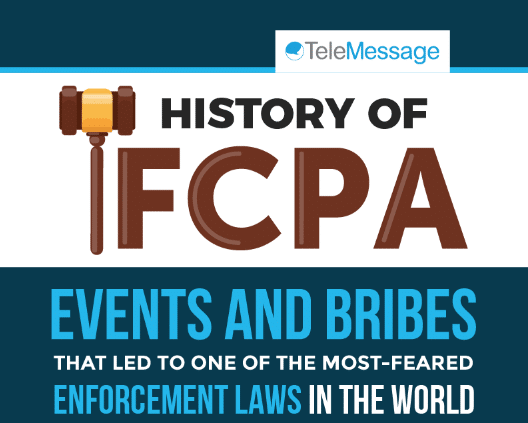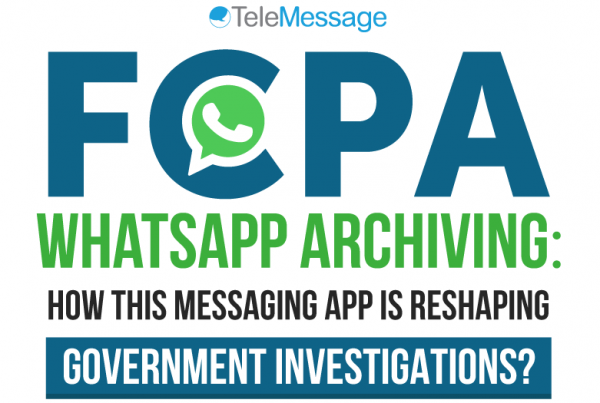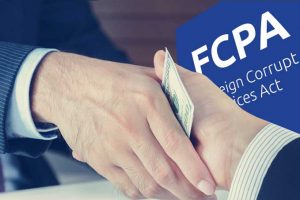On December 19, 1977, the Foreign Corrupt Practices Act (FCPA) was signed into law by President Jimmy Carter. It’s the first law in the world that addressed the then-rising bribery and corruption cases orchestrated by U.S. businesses and organizations to influence foreign government officials. Four decades later, it still remains one of the most dreaded laws known globally.
Dubbed in a New York Times article as the “center of a tug of war between business interests and federal authorities,” FCPA has indeed gained the reputation of being detrimental to international commerce. But the debates surrounding this law has never stopped the government from updating this stringent enforcement tool to cope with the changing technological landscape.
Recently, a revised version has been released and now allows ephemeral messaging apps like WhatsApp to be used by companies and organizations as long as they have a capable mobile archiving solution in place.
As with most laws, the FCPA did not just come ‘out of the blue.’ Rather, real events motivated the U.S. Congress to draft and enact the law. In this infographic, we will detail the specific events that prompted congressional concern, and the consequences of those events which motivated Congress to act.

The Watergate Scandal
Before the actual discovery of companies making bribes to government officials, it was the Watergate scandal that prompted the Department of Justice to set-up a special prosecution force to identify those companies.
The Watergate scandal began with the arrest of five men for breaking in and entering into the Democratic National Committee (DNC) headquarters at the Watergate complex in Washington D.C. in 1972. The Federal Bureau of Investigation (FBI) connected the cash found on the burglars to a slush fund used by the committee for the re-election of then-President Richard Nixon.
Investigations following the Watergate scandal revealed that the various multinational U.S. companies had made illegal political contributions to the fund with the purpose of securing contracts abroad. At that time, it was not yet illegal for U.S. companies to bribe government officials but hiding such bribes from their stockholders was.
The Subcommittee on Multinational Corporations chaired by Senator Frank Church further drilled down into these bribery concerns and found that over 400 companies had made illegal political contributions to countless foreign government officials. These companies included large and influential U.S. corporations, including oil companies, defense contractors, and an exporting company.
- Lockheed
One of the corporations that played a central part in the enactment of FCPA is the Lockheed Aircraft Corporation, which during that time was a recipient of a $250 million federal loan guarantee intended to keep the company out of bankruptcy.
The corporation was heavily implicated in bribing multiple foreign governments to sell their products, which included:
- $10 million payment to West Germany’s Minister of Defense for a billion purchase deal of 900 F-104G Starfighter jets in 1961.
- $106 million in commissions to Saudi Arabia arms dealer Adnan Khashoggi.
- Smaller bribes to Japanese Prime Minister Tanaka, Prince Bernhard (the Inspector General of the Dutch Armed Forces and the husband of Queen Juliana of the Netherlands), and Italian political parties.
- Northrop
Another defense industry giant that was implicated for bribery and charges and inspired the enactment of FCPA is the Northrop.
In September 1975, the Church Committee also revealed that aside from Lockheed, Northrop also paid the arms dealer Khashoggi $54 million in bribes in an attempt to favor their products.
According to a New York Times article, Mr. Khashoggi, a businessman with ties to the Saudi Arabian Royal family, was chairman of the Triad Financial Establishment Company, a multinational financial network. He said he had retained Clark Clifford, former United States Secretary of Defense, to represent him in the dispute with Northrop, in which an estimated $55‐million in commissions was at stake.
- Gulf Oil, Exxon Oil, Mobil Oil, and Ashland Oil
On May 16, 1976, Bob R. Dorsey, chairman of the Gulf Oil Corporation told the Church Committee that for over ten years, his company had made about $5 million in illegal political contributions abroad. This included $4‐million worth of bribes to politicians in South Korea, which Mr. Dorsey also admitted caused an “unwarranted interference in the election” there.
Mr. Dorsey said the payments to foreign groups were disguised by being sent through a Gulf subsidiary in the Bahamas that also channeled about $5‐million to American political groups such as President Nixon’s 1972 re‐election committee.
Aside from Gulf Oil, other oil companies were also found funneling huge amounts of cash to officials and hiding the transactions from their shareholders and directors. These include:
- Exxon Oil and Mobil Oil – Decades before the merger of Exxon Oil and Mobil Oil, both companies were also implicated for making illegal contributions to Italian political parties.
- Ashland Oil – Principally involved in making illegal payments to Albert Bernard Bongo, the President of Gabon.
- United Brands Company
In 1975, Eli Black, chairman and president of United Brands Company (now Chiquita Banana), committed suicide by jumping out the window of his Manhattan office. The SEC investigated his death and found that United Brands made a $1.25 million bribe to Honduran President Oswaldo López Arellano, followed by another $1.25 million the next year, in order to have taxes on banana exports lowered.
In 1974 Honduras increased its tax on banana exports from 25 cents per box to 50 cents. This protective tariff was designed to help the newly formed Union of Banana Exporting Countries (UPEB) – a cartel of Central and South American banana exporting countries – seize control of the banana market from United and other major fruit companies. At that time nearly all profits from Central American bananas wound up in the hands of North American companies.
United Brands Company paid Arellano $2.5 million to see to it that the export tax was reduced back down to 25 cents, a move that saved the company $7.5 million in taxes and led to the collapse of the UPEB.
Conclusion
It is without a question that FCPA puts a lot of pressure for U.S. companies to improve the transparency of their dealings in foreign countries. Such expectation in transparency not only includes accurate reporting of books, records, and accounts, but also the holistic archiving of text messages, voice calls, emails, MMS, and even WhatsApp chats that contain business-related information.
The TeleMessage Mobile Archiver effectively addresses compliance, regulatory, eDiscovery response requirements and reduces risk across various industry under the FCPA regulation. TeleMessage captures and records mobile content, including SMS, MMS, voice calls, social media, and WhatsApp Chats from corporate or BYOD mobile phones. Messages are securely and reliably retained within the TeleMessage servers or forwarded to an archiving data storage vendor of your choice.
Our mobile archiving products securely capture content from mobile carriers and mobile devices for a variety of ownership models (BYOD, CYOD, and employer-issued). With our multiple archiving methods, you can always find the right tools or blend for your text message archiving and voice call recording requirements:
TeleMessage offers cross-carrier and international mobile text and calls archiving for Corporate and BYOD phones. Visit www.telemessage.com to learn more about our enterprise mobile archiver’s capabilities or contact us to try our mobile archiving products today.


